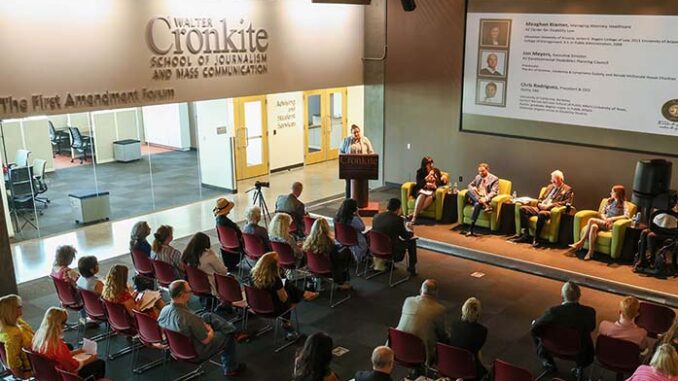
PHOENIX – Health problems forced Bill Chalmers into a guardianship after he retired from Intel as a senior engineering director.
“I suffered from sleep deprivation, and I have something called nocturnal epilepsy,” Chalmers told a group of state legislators and disability advocates at a town hall Thursday at Arizona State University’s downtown Phoenix campus. “It causes me to have disruptive sleep patterns that contributed to my erratic behavior.”
Deemed incapable of handling his own money, Chalmers’ attorney petitioned for an emergency conservatorship – a legal status in which a court appoints a person to manage the financial and personal affairs of an incapacitated person or a minor. Chalmers’ conservator charged him more than $400,000 over 13 months for services and withdrew $288,000 from his 401k account without paying taxes on the withdrawal, he said.
Chalmers shared his story as part of a town hall discussion on probate reform. His was one of nearly a dozen experiences that detailed abuses of conservatorships and the probate system.
Gov. Katie Hobbs on May 8 signed Senate Bill 1038, which creates a probate advisory panel to identify abuses in the probate system.
But legislators and disability advocates said more work needs to be done.
SB 1291 is a reform bill that would bring sweeping changes to Arizona Revised Statutes Title 14 guardianship and conservatorship laws. If signed into law, it would ensure people are kept out of isolation from their loved ones, given the right to a jury trial and guarantee that they are informed about any details or pending action pertaining to themselves and their case.
Sen. John Kavanagh, R-Fountain Hills, who sponsored SB 1291, said the bill adds supported decision-making, which allows a person to decide who will help them make decisions. It is an alternative to guardianship where a conservator is appointed for them. Legislation enabling supported decision-making has passed in 20 states.
“The whole philosophy behind supported decision-making is that it’s not a binary world,” Kavanagh said. “In the world of logic, there’s something that’s called a false dichotomy where you say to somebody, ‘Should we do this or that’ or ‘Are you this or that’ because the person who frames the question controls the debate. In a false dichotomy, they structure the debate so that you can only choose between two things, when in reality there could be a third, a fourth or a fifth possibility that’s even more reasonable than the other two.”
Kavanagh said supported decision-making simply says that maybe there is something in between. The person makes their own decisions without any restriction, he said. The bill is moving through the Legislature. Sen. Justine Wadsack, R-Tucson, who moderated the event, said she hopes the bill will be ready to go to the governor in the next few weeks.
